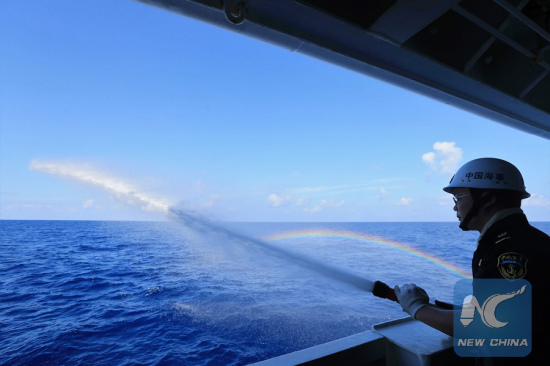
A crew member takes part in a fire drill on China's largest and most advanced patrol vessel Haixun 01 on the South China Sea, April 4, 2016. (Xinhua/Xing Guangli)
The pending decision out of the South China Sea arbitration in The Hague, which was initiated by the Philippines, is a legal monstrosity and reeks of hegemony from Washington, said Wu Ken, China's Ambassador to the Netherlands.
"China will not accept an invalid arbitral award. Abuses of international law and a hegemonic mentality have no place in any SCS dispute," Wu told Xinhua in The Hague, where a decision will be rendered in the coming months.
"Such an arbitration should not be recognized or supported in any manner," said the Chinese diplomat, who took his post earlier this month.
The Philippines illegally occupied some of China's Nansha islands and reefs in the 1970s, which created the territorial disputes between the two nations. By abusing the United Nations Convention on the Law of the Sea (UNCLOS), the Philippines advanced claims for an Exclusive Economic Zone and Continental Shelf, which overlaps China's claims and led to the current delimitation dispute.
"The UNCLOS does not address territorial disputes; with respectto delimination dispute, China has declared in accordance with the Convention that it does not accept compulsory procedures," the ambassador noted, " Thus, to settle SCS disputes through peaceful negotiation is consistent with an agreement between China and the Philippines and other ASEAN states. It is also consistent with international law regarding the SCS."
In his opinion, Manila has plainly abused the legal proceedings when it unilaterally initiated the arbitration. "The 15 submissions of the Philippines are closely related to territorial sovereignty and maritime delimitation, which are beyond the scope of the arbitration. Manila breached its commitment to settling disputes through negotiations," Wu said.
"According to the express provisions of the UNCLOS, with China's declaration, relevant dispute could only be submitted to compulsory procedures with agreement of the parties. The Philippines has no unilateral right to initiate the arbitration," said the ambassador.
The ambassador regretted that the Philippines' abuse of the legal process hasn't been stopped sooner, but incredibly fostered by abuses of jurisdiction. "Without China's participation, any ruling from the tribunal has no legal basis."
According to Wu, the then Japanese president of the International Tribunal for the Law of the Sea (ITLOS) Shunji Yanai, who was entrusted to organize the tribunal under the Convention, turned a blind eye to the Convention's provisions.
"He assembled five lawyers of international law into a biased arbitral tribunal, which is tilted towards the Philippines and ignored what China stands for," said Wu.
The Chinese diplomat also noted that the SCS arbitration reeks of involvement by the United States. Washington has threatened that Beijing will pay for not accepting the tribunal's decision.
"How can a non-contracting State which selectively ignores the provisions of the Convention present itself as a judge for the Convention?" Wu questioned.
In his view, Washington has become a front-stage actor in the dispute. Despite fears to the contrary, nobody has encountered any problem with the freedom of navigation in the South China Sea, he said.
"What 'freedom of navigation' is to be defended by American warships patrolling near Chinese islands and reefs? They slap a label of 'militarization' regarding China's right to build facilities on its own territory. Take a look at the frequent U.S. military exercises in the South China Sea, what are they doing?" questioned the Chinese ambassador.
By repeatedly reinforcing its military existence in the South China Sea, Washington has violated basic international norms of peace, he said.
"Neither the Philippines nor the tribunal can change China's sovereignty over the SCS Islands and their adjacent waters," said Wu.
"They will not weaken China's determination and volition to safeguard its national interests and the dignity of international law. Nor will they affect China's sincerity in peacefully resolving disputes through direct negotiations," he added.
"The SCS disputes are very complex. However, with the guidance of the UN Charter and relevant international laws and together with China's maritime neighbors, China is confident and able to manage the disputes through rules and mechanisms, to mitigate disputes through maritime cooperation and to reach a final settlement through negotiations," he concluded.


















































